

Sociology of Religion. Sociologie des religions. Faith. Etymology[edit] The English word is thought to date from 1200–50, from the Middle English feith, via Anglo-French fed, Old French feid, feit from Latin fidem, accusative of fidēs (trust), akin to fīdere (to trust).[7]
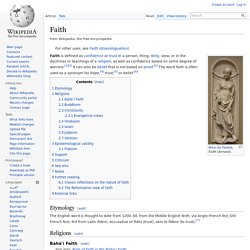
Foi en philosophie. Un article de Wikipédia, l'encyclopédie libre.
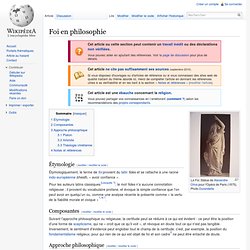
Étymologie[modifier | modifier le code] Étymologiquement, le terme de foi provient du latin fides et se rattache à une racine indo-européenne bheidh, « avoir confiance ». Pour les auteurs latins classiques[Lesquels ?] Faith Synonyms, Faith Antonyms. Chart of James Fowler's Stages of Faith. Sincerity. Sincerity is the virtue of one who speaks and acts truly about his or her own feelings, thoughts, and desires.

In Western societies[edit] Sincerity has not been consistently regarded as a virtue in Western culture. [citation needed] First discussed by Aristotle in his Nicomachean Ethics, it resurfaced to become an ideal (virtue) in Europe and North America in the 17th century; and it gained considerable momentum during the Romantic movement, when sincerity was first celebrated as an artistic and social ideal. Indeed, in middle to late nineteenth century America, sincerity was an idea reflected in mannerisms, hairstyles, women's dress, and the literature of the time. More recently sincerity has been under assault by several modern developments such as psychoanalysis and postmodern developments such as deconstruction.
Aristotle's views[edit] Perseus Project Nic. Sincérité. Un article de Wikipédia, l'encyclopédie libre.

La sincérité est l'expression fidèle des sentiments réels[1], par la vérité. La sincérité peut être vue comme une vertu philosophique ou comme un risque pratique. Étymologie[modifier | modifier le code] Une étymologie populaire fait remonter le latin sincerus à l'association sine et cera (sans cire). Les interprétations basées sur cette association sont rejetées par les dictionnaires d'étymologie[2]. Philosophies orientales[modifier | modifier le code] La sincérité dans la religion musulmane a une grande importance[réf. nécessaire]. Humility. Representation of Humility in a stained-glass window, by Edward Burne-Jones.
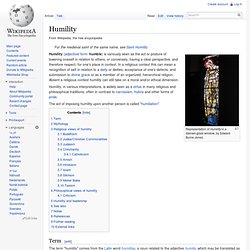
Humilité. Un article de Wikipédia, l'encyclopédie libre.
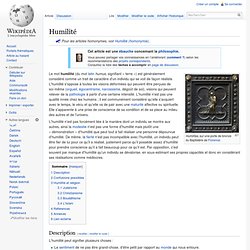
Humilitas, sur une porte de bronze du Baptistère de Florence. Le mot humilité (du mot latin humus, signifiant « terre ») est généralement considéré comme un trait de caractère d'un individu qui se voit de façon réaliste. L'humilité s'oppose à toutes les visions déformées qui peuvent être perçues de soi-même (orgueil, égocentrisme, narcissisme, dégoût de soi), visions qui peuvent relever de la pathologie à partir d'une certaine intensité. L'humilité n'est pas une qualité innée chez les humains ; il est communément considéré qu'elle s'acquiert avec le temps, le vécu et qu'elle va de pair avec une maturité affective ou spirituelle. Category:Religious behaviour and experience. Crisis of faith. Crisis of faith is a term commonly applied, especially in Western culture, to periods of intense doubt and internal conflict about one's preconceived beliefs or life decisions.
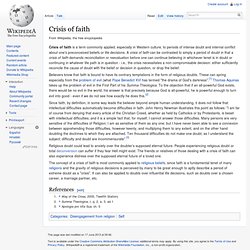
A crisis of faith can be contrasted to simply a period of doubt in that a crisis of faith demands reconciliation or reevaluation before one can continue believing in whichever tenet is in doubt or continuing in whatever life path is in question - i.e., the crisis necessitates a non-compromisable decision: either sufficiently reconcile the cause of doubt with the belief or decision in question, or drop the belief.
Believers know that faith is bound to have its contrary temptations in the form of religious doubts. These can spring especially from the problem of evil (what Pope Benedict XVI has termed "the drama of God's darkness".[1] Thomas Aquinas takes up the problem of evil in the First Part of his Summa Theologica. Religious doubt could lead to anxiety over the doubter’s supposed eternal future. Knowledge. Knowledge acquisition involves complex cognitive processes: perception, communication, and reasoning; while knowledge is also said to be related to the capacity of acknowledgment in human beings.[2] Theories of knowledge[edit] In contrast to this approach, Wittgenstein observed, following Moore's paradox, that one can say "He believes it, but it isn't so," but not "He knows it, but it isn't so.

" [5] He goes on to argue that these do not correspond to distinct mental states, but rather to distinct ways of talking about conviction. What is different here is not the mental state of the speaker, but the activity in which they are engaged. For example, on this account, to know that the kettle is boiling is not to be in a particular state of mind, but to perform a particular task with the statement that the kettle is boiling. Wittgenstein sought to bypass the difficulty of definition by looking to the way "knowledge" is used in natural languages.
Connaissance. Un article de Wikipédia, l'encyclopédie libre.
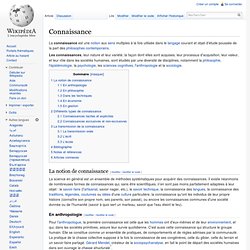
La connaissance est une notion aux sens multiples à la fois utilisée dans le langage courant et objet d'étude poussée de la part des philosophes contemporains. New Religious Movement. Ernst Troeltsch's church-sect typology, upon which the modern concept of cults, sects, and new religious movements is based.
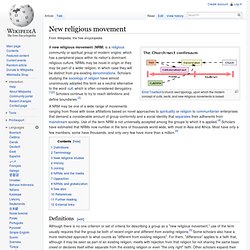
A new religious movement (NRM) is a religious community or spiritual group of modern origins, which has a peripheral place within its nation's dominant religious culture. NRMs may be novel in origin or they may be part of a wider religion, in which case they will be distinct from pre-existing denominations. Scholars studying the sociology of religion have almost unanimously adopted this term as a neutral alternative to the word cult, which is often considered derogatory.[1][2] Scholars continue to try to reach definitions and define boundaries.[3] A NRM may be one of a wide range of movements ranging from those with loose affiliations based on novel approaches to spirituality or religion to communitarian enterprises that demand a considerable amount of group conformity and a social identity that separates their adherents from mainstream society.
Nouveau mouvement religieux.